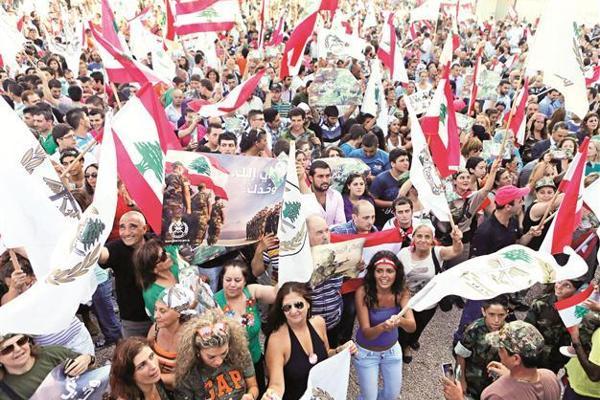Back-to-back scandals harm hope of unity in sports for the Lebanese
James M. DORSEY Hürriyet Daily News


In this file photo, people and relatives of Lebanese Army soldiers, who were killed during clashes in the country, carry national flags and pictures of killed soldiers during a rally to express solidarity with the army on their 68th Army Day. REUTERS photo
As Lebanon, a country in which almost every facet of life is defined by sectarian fault lines, teeters in the shadow of the civil war in next-door Syria, the country is also being rocked by multiple mushrooming sports scandals.Months after a massive football match-fixing scandal became public and three international Lebanese referees were detained in Singapore for accepting sexual favors, Lebanon’s basketball team was this month forced to return home from the Philippines after the International Basketball Federation (FIBA) banned it from participating in international competitions. The ban was the result of political interference in a dispute in the Lebanese basketball association.
The scandals dashed government hopes that sports could help it maintain a sense of national unity inspired earlier this year by initial football successes in 2014 World Cup qualifiers – a tall order in a country of 4 million that is divided among 18 Muslim and Christian sects, scarred by 15 years of civil war that ended with a fragile peace in 1991 and whose largest political grouping, Hezbollah, has sided militarily with the embattled regime of Syrian President Bashar al-Assad.
To Beshara Abboud, the owner of a historic Beirut gym that was closed and torn down, they are also a symptom of the decline of Lebanese sports. “There is no sport in Lebanon now. I am in the boxing federation, and we struggle to find people to train, to play,” he told The Daily Star.
Political interference, the football scandals coupled with the ban on the basketball team, competition from state-of-the art health clubs, the commercialization of sports and increasing incidents of doping were the death of his gym, Abboud said.
‘The end’
“In 1998, we went to a bodybuilding competition and I couldn’t believe it [the widespread use of steroids]. I told my team they could stop if they wanted, win or lose, [but that] this is not our place. We stopped after that; the steroids are too much,” he said. As the building of his gym is replaced by an apartment block, he adds: “Now it is at the end.”
Originally operated by his father, Khalil, a football player, the gym served as a training facility during World War II for soldiers being dispatched to North Africa as part of the French military. The gym’s popularity prompted Lebanon’s Christian Kataeb Party, whose headquarters were nearby, to assist in replacing the gym’s tent with a more permanent structure. The Kataeb withdrew when the gym started attracting people from other sects.
American University of Beirut political scientist Danyel Reiche describes professional sports and particularly football in Lebanon in an essay in Third World Quarterly as the sector with the most “direct confrontation among the different sectarian and political groups” because “whereas the political system prevents sects from competing with each other there are no separate sectarian [sports] leagues.” Quoting George Orwell, Reiche says Lebanese football amounts to “war minus the shooting.”
The scandals kicked off when the Asian Football Confederation (AFC) said in February that it was investigating the involvement of players and administrative staff of the Lebanese Football Federation (FLFA) in match-fixing. In total, 20 players and an administrator were banned for life and fined $15,000 each.
Basketball scandal
The basketball scandal erupted in May when a Lebanese Basketball Championship quarterfinal match was canceled between rivals Champville, which is backed by the Free Patriotic Movement of former president and Hezbollah ally Gen. Michel Aoun, and Amchit, which is chaired by current President Michel Suleiman’s son and backed by the Mustaqbal movement that is headed by Suleiman and caretaker Minister Mohammed al-Safadi. The cancelation and awarding of the match to Champville was prompted by tensions caused by Suleiman’s armed bodyguards.
Rejecting the decision, Amchit violated the Lebanese association’s rules by filing a lawsuit against Champville and the Lebanese basketball governing body, which in turn prompted the international ban. Amchit is backed by several other clubs, including one that is headed by an ally of the president, another that is owned by the finance minister and a fourth that is in Beirut and that is affiliated with the country’s Sunni prime minister.
Amchit subsequently said it was dropping its lawsuit in the hopes that FIBA would lift its ban after players protested against the intertwining of sports with politics. The Amchit effort, however, was thwarted when the club and its backers refused to sign a memorandum of understanding proposed by FIBA in which they would agree not to revert to the judiciary to settle disputes.
